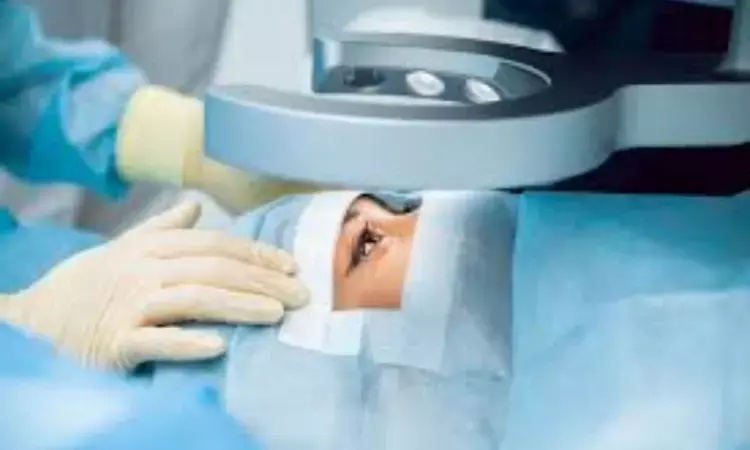- Home
- Medical news & Guidelines
- Anesthesiology
- Cardiology and CTVS
- Critical Care
- Dentistry
- Dermatology
- Diabetes and Endocrinology
- ENT
- Gastroenterology
- Medicine
- Nephrology
- Neurology
- Obstretics-Gynaecology
- Oncology
- Ophthalmology
- Orthopaedics
- Pediatrics-Neonatology
- Psychiatry
- Pulmonology
- Radiology
- Surgery
- Urology
- Laboratory Medicine
- Diet
- Nursing
- Paramedical
- Physiotherapy
- Health news
- Fact Check
- Bone Health Fact Check
- Brain Health Fact Check
- Cancer Related Fact Check
- Child Care Fact Check
- Dental and oral health fact check
- Diabetes and metabolic health fact check
- Diet and Nutrition Fact Check
- Eye and ENT Care Fact Check
- Fitness fact check
- Gut health fact check
- Heart health fact check
- Kidney health fact check
- Medical education fact check
- Men's health fact check
- Respiratory fact check
- Skin and hair care fact check
- Vaccine and Immunization fact check
- Women's health fact check
- AYUSH
- State News
- Andaman and Nicobar Islands
- Andhra Pradesh
- Arunachal Pradesh
- Assam
- Bihar
- Chandigarh
- Chattisgarh
- Dadra and Nagar Haveli
- Daman and Diu
- Delhi
- Goa
- Gujarat
- Haryana
- Himachal Pradesh
- Jammu & Kashmir
- Jharkhand
- Karnataka
- Kerala
- Ladakh
- Lakshadweep
- Madhya Pradesh
- Maharashtra
- Manipur
- Meghalaya
- Mizoram
- Nagaland
- Odisha
- Puducherry
- Punjab
- Rajasthan
- Sikkim
- Tamil Nadu
- Telangana
- Tripura
- Uttar Pradesh
- Uttrakhand
- West Bengal
- Medical Education
- Industry
Topical atropine and NSAIDs before cataract surgery may reduce IFIS risk

Cataract Surgery
Israel: Preoperative administration of topical atropine 1% and non-steroidal anti-inflammatory drugs (NSAIDs) before cataract surgery may prevent intraoperative floppy iris syndrome (IFIS), says a recent study. The study appears in Graefe's Archive for Clinical and Experimental Ophthalmology.
The study was conducted by Margarita Safir, Sackler Faculty of Medicine, Tel Aviv University, Tel Aviv, Israel, and colleagues with an objective to examine the efficacy of preoperative administration of topical atropine 1% and NSAIDs for the prevention of intraoperative floppy iris syndrome in a retrospective cohort study.
The study included patients who underwent cataract surgery by phacoemulsification between July 2019 and February 2020 in two hospitals in Israel having similar patient demographics and similar surgical techniques. However, they differ in policy of IFIS prevention.
In Meir Medical Center no preventive medications are given pre-operatively, while in Shamir Medical Center patients at risk for IFIS receive topical atropine 1% once daily and non-steroidal anti-inflammatory drugs (NSAIDs) thrice daily for 3 days preoperatively.
Overall, the study included 207 eyes of 207 patients with a history of alpha-antagonist use. Mean age was 74.9 ± 7.8 years and 82.1% (n = 170) were male.
The study revealed the following findings:
- Among patients from the pretreating center, 86.8% (n = 92/106) were pre-treated with either NSAIDs or atropine preoperatively, while in the non-pretreating center no treatment was prescribed (n = 0/101).
- IFIS rate among the non-pretreating center was 29.7% (n = 30/101) compared to 15.1% (n = 16/106) in the pretreating center.
- When strictly comparing treated to untreated patients, the treated group had an IFIS rate of 12.0% compared to 30.4% among the untreated.
- Adjusted for age and gender results remain consistent (odds ratio 0.329 for treated patients).
The findings led to the conclusion that IFIS rates were significantly lower in the pretreating center versus the non-pretreating center. Differences were even more pronounced when comparing strictly treated to untreated patients.
Reference:
Sharon, T., Hecht, I., Atar Vardi, M. et al. Preoperative atropine and non-steroidal anti-inflammatory drugs for the prevention of intraoperative floppy iris syndrome. Graefes Arch Clin Exp Ophthalmol 260, 893–900 (2022). https://doi.org/10.1007/s00417-021-05444-1
Dr Kamal Kant Kohli-MBBS, DTCD- a chest specialist with more than 30 years of practice and a flair for writing clinical articles, Dr Kamal Kant Kohli joined Medical Dialogues as a Chief Editor of Medical News. Besides writing articles, as an editor, he proofreads and verifies all the medical content published on Medical Dialogues including those coming from journals, studies,medical conferences,guidelines etc. Email: drkohli@medicaldialogues.in. Contact no. 011-43720751


